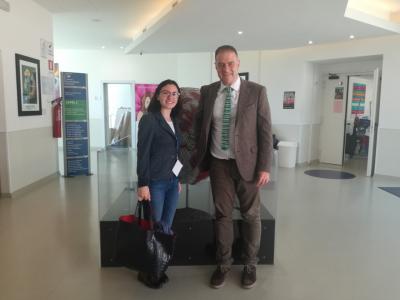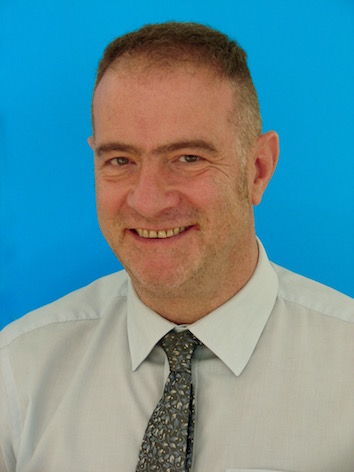Interview: RIS nurturing 'global citizens' for changing times

ROME- Anthony Allard is Principal for Middle and High School at Rome International School (RIS). He studied Agriculture and Biology at Bangor University in Wales. Trained as a teacher at the University of Leicester, he earned his headteacher's qualification with the National College for School Leadership in Nottingham. He began as a Science teacher in Derbyshire before teaching Biology in Tamworth. He was a Head of Year at Myton School in Warwick before becoming Assistant Headteacher at a state school in Leicester, then headteacher at the Oshwal Academy Senior School in Mombasa. Mr. Allard arrived at RIS in June 2014
Q: When we first met in 2015 it had been your first year at RIS. Your goal was to “push boundaries”: how have you done this so far?
AA: "We achieved several things that have pushed boundaries. Firstly by getting more students into the best universities across Europe and North America –- we just celebrated the seventh IB graduating class. This week is the history fair, something that has been going on for years. The students are showing their work in result of the partnership with the Carabinieri Tutela Patrimonio Culturale. It sounds better in Italian: “Recuperare il passato per avere il future”(Rescuing our past to build our future). We are confident in showing our work to parents and the wider community. Not just the history fair, but also the book club, and the art exhibition that the IB students organised."
Q: RIS believes in preparing students for the “world of tomorrow.” How?
AA: "Nobody knows what the world of tomorrow will look like. We might guess but nothing dates faster than someone’s else idea of the future. What this school is good at is creating a sense of awe and wonder in the children. Adding ideas and thoughts to studies and looking at things that make them amazed and want to learn. To love learning for its own sake is necessary for the future. You can constantly anticipate or imagine the future and suggest all sorts of ideas about what needs to be done to equip children but ultimately nobody really knows."
"In the past people worked with their hands and to a great extent that labour has been taken away from us with machinery and AI. What will be left to explore is the way we interact with each other on a personal level particularly on social media. Even Facebook might become out of date in 10/20 years time. I believe in 50 years’ time people might look back at social media in a way we look back at Egyptian hieroglyphics."
"The concept of digital citizenship is important and we must teach how to behave responsibly on social media. Our school, in partnership with the Carabinieri and the local police, has done a lot of training with the students about staying safe online. There is no doubt social media is still valuable. All we can do is encourage to use it safely. But it goes beyond just emotional intelligence, more how people should interact and treat each other on a personal level. We work hard at RIS to ensure students feel safe and confident. I have seen some remarkable transformations of shy and nervous students become confident and enthusiastic. It is something our school does very well."
RIS’s mission statement: Our mission is to provide a nurturing environment in which children of all nationalities and faiths can explore and respect their own and other’s cultural and religious heritage.
Q: Considering RIS’s mission statement how is the school approaching the negativity and increase in discrimination due to a current tense worldwide political state?
AA: "As a school we model the idea that we are a better place. In other words there might be situations out in the world of people of different religions, cultures, countries, races who are in conflict. That is something that we have zero tolerance for here. The students are respectful and kind. Not because of race or religion it is just because children are children."
"We teach a global vision and mission statement. In humanities, for example, students have spent a lot of time exploring if race is a biological construct; in other words, if racism is acceptable from a biological point of view and the answer was: ‘no, it isn’t.’ We actively teach and challenge all values, but also challenge ideas that people have that go beyond facts and evidence."
Q: In June 2016 RIS was recognised by the Foundation for Environmental Education (FEE) as an ECO-SCHOOL gaining the “Green Flag”: How did RIS gain this title and how is the school approaching scepticism with global warming?
AA: "The teacher who walked in [the interview] just came to see me about an extended essay offered in IB about climate change and global warming. It is at the forefront of student’s minds. As an ECO-SCHOOL RIS has to comply with a set of parameters. Students are encouraged to respect the natural environment. This goes beyond teaching by offering a practical example; all the food in our canteen is organic. In the high school we slightly revised the time table so students do more physical activity."
"The green flag is about keeping the school’s environmental footprint as small as possible.We financially support school buses and encourage car sharing."
Q: In which field do RIS’s student excel the most?
AA: "One field that our students do very well in is languages. We get very good grades in French, Spanish, Chinese, and Italian. An increase in the results in history and philosophy is gratifying. Our maths results are something to be proud of and we see it in the increasing number of students achieving IB High Level Maths every year. The results in physics and chemistry compared to biology last year and this year kept very high standards. We’re seeing a strong level in languages, but a definite growth and improvement in other fields like the physics, sciences and mathematics."
Q: Considering the tough curriculum presented at RIS how does the school keep students motivated?
AA: "Firstly, we celebrate achievements. As mentioned before this school is about creating confidence and this is a way to do so. It helps to create confidence and belief."
"Secondly, it’s about knowing that it’s okay to make a mistake. Children often feel afraid to make mistakes. We teach that it doesn’t matter how many times they get it wrong as long as they learn from it. And if someone gets it right all the time it means they are not sufficiently challenged."
"We celebrate the achievements of high school students at their graduating ceremony, showing those students who have had difficulties, yet have graduated successfully and can become role models for other students."
Q: In these three years as principal, which has been your greatest challenge?
AA: "It is very easy to make a mistake. The key is to then say, “this is what we’re going to do to get it right.”One thing about our school is change. We like change, because otherwise it is about standing still and going backwards. The world is changing quickly, the school has to adapt. Adapting to life in Italy and learning Italian, particularly as some words don’t translate easily has been a challenge."
Q: Which is your advice to your students facing a challenge?
AA: "Firstly sit down and think about all the things that you feel good about; that could be your family, your friends, where you live, what you’re doing, things that make you happy. And if that does not cheer you up think about all the things that are bad and ask yourself, 'is it that bad?' or 'what is the worst thing that can happen?' or 'What can I do about things that make me unhappy?' "
"Especially with children I tell them to find someone who is trustworthy and knows what there are doing. It might not be a friend in school or family member, sometimes you need someone else and we’re lucky that on our campus we have counsellors and teachers."
"How to motivate yourself is a different question. I believe this is where school has an important job. You need to look at all the possibilities and the things you’re capable of doing. Ambitions, goals, aspirations and dreams are really important and are worth having."
Q: Which is the school’s ambition for the future?
AA: "To be the best role model, and I believe we already are. My personal aspirations are to continue to develop a cultural presence on a world class level, that means through music, through the arts, through drama. One thing I am pleased to see is that we have now students who are able to perform in front of the whole school. We are extremely proud of the results that we’ve seen."
"I know I said that you cannot always imagine the future but to really work on things like artificial intelligence, robotics, and, in particular, programming, because when people talk about ICT education, we should not be learning to use someone else’s idea, but to learn to use IT for our own needs and imagination. So that’s another important ambition."
Q: On an educational perspective will machines take over?
AA: "To some extent it has and things have been better for us. In history we learn about Richard Arkwright who invented the spinning frame, yet actually a similar piece of technology had been invented about 200 years earlier; when it was presented to Queen Elizabeth I, she was horrified because she believed that mechanized textile production would take away lots of peoples’ jobs so she forbade its use. Ultimately it didn’t and there is evidence it created plenty of new jobs. Creative destruction has to be embraced. Creative destruction means avoiding progress because we define its disadvantages in today’s terms and fail to see the potential in the future."
"We must embrace change but also protect people from its consequences. First do no harm. Go back to this idea that, generally, change is exponential and inevitable. The school tries to teach that learning is good for its own sake."
"You have to learn how to learn. Not to learn and stop. You should never stop doing that just because your academic career is over. Learning is a continuous process."
Q: Any further comments for our readers?
AA: "When I came three years ago I knew this to be a very good school. And I think that the new building has lived up to its promise. But more than that it has become a place for children to enjoy coming to. If you enjoy coming to school, you feel a bit tired at the end of it, and you have learned something in between then you are halfway there. Then if you make a positive difference in your own life and for those around you, you are well on the way to being a global citizen and in difficult and changing times, that’s what we all aspire to be."
jp-jj-ag




